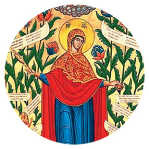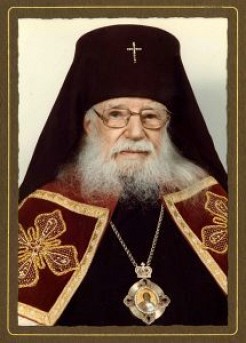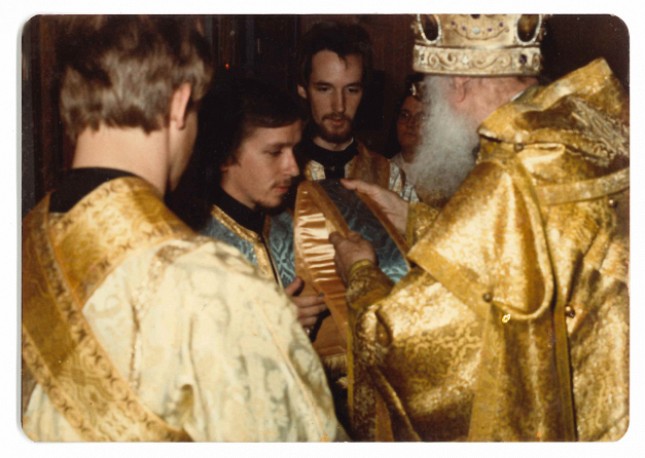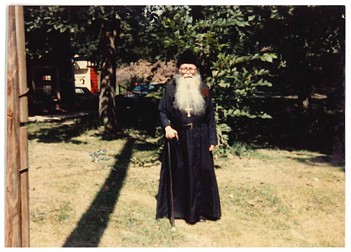John Michael Patrick Branham, known to us by his Orthodox name Vladimir, was one of the last babies born at Wakeman Hospital Center at Camp Atterbury Military Hospital in Edinburgh, Indiana before the base deactivated. He has a younger sister, Marcie. They grew up in Indianapolis. His father served in the Army as part of the occupation force in Bavaria, Germany, retiring as a Sgt. Major. His mother was a stay-at-home mom until her children were in school, then she worked as a switchboard operator. While his father was overseas, Vladimir, his sister, and his mother lived with her parents. Vladimir attended Holy Cross Grade School and actually knew our Rafael during those years. He made his First Holy Communion and was confirmed before moving to the all-boys Catholic High School, a Latin school also known at the time as a High School Seminary. In between these, in eighth grade, Vladimir became interested in Orthodoxy. He used to look at a photo of a Russian Orthodox Church Service, which made him curious. He says, “I always had a great love for the church.”
Vladimir went to Fordham Catholic University in New York City, “the Jesuit University of New York.” Their motto is Sapientia et Doctrina (wisdom and learning). He modeled this by having very few extracurricular activities because “I devoted my time to studying.” Vladimir says, “I was very boring person in University. I studied most of the time and couldn’t afford to go out on the town.” I did some odd jobs here and there, mostly retail. His studies allowed him to excel in history, religion, and English Literature. And math? Well, his math professor recommended that he choose a career that didn’t require proficiency in math.
Growing interest in Orthodoxy
From grade school, Vladimir wanted to be a priest, but during the times of Vatican II and following, he felt the changes being made were chaotic. In college he was exposed to Orthodoxy much to the chagrin of a lot of his teachers some of whom were Jesuit priests. “They weren’t very happy with me because I would keep asking them questions about Orthodox this and Orthodox that,” and they would always ask me, “Well are you thinking about becoming orthodox?” and I explained to them, “Well if you change one more thing in the Roman church, yeah that may push me over the edge.”
After earning a BA in History, Vladimir went back to Indianapolis. For a while he was working for the state of Indiana in a department that basically handled of child welfare, food stamps, WIC program, and welfare programs for the state. That department doesn’t exist anymore as many of the programs were passed down to county level. Vladimir worked in a narrow room in the basement. It was basically a storeroom for all the forms that are used by the counties. They also had a printing shop and his job was to go around to the counties and deliver all these forms. Vladimir is probably one of the only people who has been to every one of the 92 county seats in the state of Indiana.
Vladimir started attending an Orthodox Church where he and the priest got to know each other pretty well. The people were very friendly with a lot of young people like Vladimir at the time. He observed that this was different than what he was used to, and he liked it, so he stuck around. It was called Christ the Savior, but it’s been closed for a number of years. However, it was where Vladimir came into orthodoxy. The priest decided that Vladimir’s baptism in the Catholic Church was valid, so Vladimir agreed to be Chrismated.
Vladimir was exposed to other Orthodox groups in situations like visiting the cathedral in Chicago, which is a Russian church. He got to know a lot of a lot of priests and clergy outside of Indianapolis, which introduced him to the ethnic element of orthodoxy. Since he was already familiar with the Russian language, the priest used him for that talent. He also knew Slavonic, which is a liturgical language that is an old form of Russian much like Latin is to the Roman church.
Wait a minute – Russian?
While at Fordham University, if you were doing Eastern studies they recommended that you take Russian because they felt it would come in handy. That proved to be a wise move for Vladimir’s early jobs and later when he was interrogated by the Militia in Russia (but we’re getting ahead of ourselves).
The church here in Indianapolis had left the Orthodox Church in America (OCA) and had joined the Church Outside of Russia (OCOR), which isn’t commonly known in this country. Later, the priest was getting ready to leave to go to another part of the country and he knew that probably the church was would close shortly after that, so he arranged for Vladimir to go to Chicago and become what is known as the Cell Attendant for Archbishop Seraphim (aka, Vladika) who, in his younger years had been an officer in the Imperial Russian Army. Vladimir calls it his “heavy introduction into epic orthodoxy.” The archbishop was known to be more like a drill sergeant in the Marine Corps. However, Vladimir explained that he was a very nice man who had gone through a lot in his own life. He learned a lot from the archbishop especially historically and liturgically. According to Vladimir, he and Archbishop Seraphim had “one of those relationships I call love – hate. You never knew exactly what was going on with us from time to time especially if we were having a heated conversation (or some people might even say an argument).”
As the Cell Attendant, Vladimir was a cross between a butler and a personal attendant. He was responsible for providing meals, making sure the laundry was done, and running errands – whatever was necessary to free the archbishop to attend to his heavy workload. Archbishop Seraphim decided to make Vladimir a sub-deacon and Vladimir responded that he expected that sometime in the future. Archbishop Seraphim said, “No, not eventually. We’re going to do it now.” Vladimir explained that when the archbishop made a decision, that was it. And if he said, “In a little while,” it usually meant be ready in two hours! From then on Vladimir acted as the personal sub-deacon for the archbishop.
Vladimir also got to know Fr. Theophan while in Chicago. “Fr. Theophan is the reason I am a big devotee of the Jesus Prayer.” They became good friends; Vladimir grew spiritually and shared the same mischievous sense of humor with the priest, which was not always appreciated by the Archbishop. Fr. Theophan also had a habit of talking to angels – not just talking to them but having a conversation with them.
One day Vladimir was scheduled to drive Fr. Theophan to an appointment and as time drew near, he went out to find him sitting on a bench by the lake. As he approached, he could hear Fr. Theophan talking softly, but no one else was around. This was during the time before cell phone use, so it seemed strange to Vladimir that this man was just talking. Then he began to sing a simple song Vladimir had never heard before. Every once in a while, he would say, “Did I get that right?” or “Is that the way it goes?” Not wanting to embarrass Fr. Theophan, Vladimir cleared his throat loudly and stepped up to the priest. “Father,” he said. “It’s time for us to leave for your appointment.” As they walked to the car, Vladimir asked, “Who were you talking to?” Fr. Theophan replied, “Oh, I was just talking to an angel. He was teaching me a song.” This apparently happened often enough that the father would sometimes teach a new song at the dinner table. “An angel taught me this one today,” he would say. “That’s how deep his devotion was to Christ and heavenly things,” said Vladimir. “He was a man who conversed with angels.”
Eventually Archbishop Seraphim decided that he wanted his Cell Attendant to be a monastic and Vladimir was not interested in that, so he returned to Indianapolis. A priest, who was a friend of his, was getting ready to go to a parish in Tampa, Florida and invited Vladimir to go along. “This parish appears to need a lot of work and you can put your administrative skills to use and help in other ways. Vladimir became the choir director and helped wherever needed including working on the interior of the building, which was in bad shape. Vladimir spent 19 years there with a mix of people and cultures including Russians and Ukrainians.
An offer he couldn’t refuse!
While Vladimir was at this parish, the Moscow Patriarch Bishop came to him and said, “You know you should go seminary.” Vladimir asked, “Where?” The bishop replied, “Well you can go to Russia.” Vladimir protested that it would cost a lot to do that. The bishop told him that it would not cost him anything. and explained that at that time, the church really had a lot of money because the money that they had couldn’t really be spent readily without government permission. “All you have to do,” he told Vladimir, “is buy yourself a ticket and you have to have an open ticket, so you can return. You go to the seminary in Saint Petersburg because they only allow foreign students to go there. The Soviets keep all the foreign students together in one place so they can watch them. All you need is enough money to buy gifts and personal necessities. Everything else is covered.” Vladimir, not really knowing what he was getting into, threw caution to the wind and the next thing I knew, he was on a plane to Russia.
Interrogated by the Saint Petersburg Militia
Vladimir and some friends from the seminary were walking around Saint Petersburg (sometimes referred to “the Venice of the North,”) observing that it was a very pretty city, although a little shabby (communism had not fallen yet). His friends were nearby, and Vladimir was taking pictures by myself. He spotted a beautiful bridge over a canal. He decided to take a picture and was framing it to include the bridge and the canal below it. Unbeknownst to him, his friends were frantically waving at him – trying to get his attention. His didn’t notice. The next thing he knew he had two men in uniform standing next to him. They looked like army uniforms but actually they were militia, which is what they call the police. There was one at each arm. One said (in broken English), “Please to come with us.” Vladimir said, “Okay,” and they took him to the police station.
His friends immediately went back to the seminary to report what had happened.
Meanwhile, Vladimir was sitting in a room that looked like something out of a bad movie. It was a bare room with a small table, two chairs, and a lightbulb swinging on a cord from the ceiling. He sat there for a very long time before a man in uniform arrived and sat across the table from him. He had Vladimir’s camera and passport with him, and the interrogation began. He started talking in Russian, then switched to broken English.
“Do you know why we have detained you?”
“No. I have no idea.”
“You were taking pictures.”
“I was taking a picture of a bridge.
“That is forbidden. Foreigners cannot be taking pictures of strategic structures.”
At this point Vladimir was getting frustrated. He knew the man was just trying to talk to him in English, not necessarily to impress him, but his attempt to communicate was going very badly. And Vladimir had asked several times to talk to somebody from the US council and was told it would happen later.
Having reached his point of maximum frustration, Vladimir leaned over the table and said (in Russian), “Well if we have to continue, it would go a lot quicker if we both spoke Russian!”
Surprised, the guard looked at him and said, “Oh, you speak Russian?”
Vladimir replied, “Yes, I speak Russian very well.”
He didn’t think about it at the time but actually that made the Soviet even more suspicious.
Meanwhile the people from the seminary had come to inquire about Vladimir, but before they came, they contacted the American Council at Saint Petersburg and told him about the situation, so they showed up about the same time.
The guard, having been pulled out and notified about the visitors, came back into the room and explained to Vladimir, “We are going to give you back your camera however you will not get the film. You will not be allowed to take any more pictures while you are in Soviet Union and you must remain on seminary premises. You are not allowed to be off campus while you’re here.
Vladimir protested, “But I have another two years before I’m finished!” The guard replied,
“You can either stay at the seminary for two years or leave the Soviet Union now. Your choice.”
Vladimir stayed and finished his last years at the seminary, even slipping out a few times. Although he finished the complete three year program, the Soviets at that time did not grant diplomas to foreigners, so Vladimir left with what is known as a licentiate note which said that he completed the studies and could have been ordained. He chose not to be.
We’d like to add that someone told us that Vladimir had been in prison in the Soviet Union, so we asked him about that. “Where did you hear that? I was never in prison there, but at the time this happened, I was concerned that I might be headed there!”
Vladimir returned to the US and was invited to come to Florida. He spent some time there working in retail and serving a few parishes. The friends he had in that area had moved on and he wanted to be closer to friends and family, which precipitated a return to Indianapolis. He got a job working with people with mental disorders who were living in traditional living facilities. He developed an in-depth knowledge of pharmaceuticals used in mental health and acted as an advocate for patients who were not doing well on their meds and needed someone to help them work with their doctor to get it straightened out.
Retired now, Vladimir volunteers helping people in substance abuse programs. He also serves as a sub-deacon at Joy. I asked him what people don’t know about him and might be surprised to hear. He replied with a big smile, “I have an irreverent sense of humor.”
Notes
See where Vladimir has traveled in Indiana! https://en.wikipedia.org/wiki/List_of_counties_in_Indiana
Read about Archbishop Seraphim here: https://orthodoxwiki.org/Seraphim_(Ivanov)_of_Chicago
Photos marked (VB) are courtesy of Vladimir Branham. Many thanks to Mike Drippé for converting them to an electric format for use in this blog!
Other photos were taken from the Joy Facebook page https://www.facebook.com/Joy-of-All-Who-Sorrow-111635712210166/ .
Writer Anna Glass is a member of Joy who serves on the Transforming Joy Steering Committee. She also publishes Fr. John’s E-weekly. If you have enjoyed these, please scroll down, click on “donate” and give to our Capital Campaign. Thank you.




